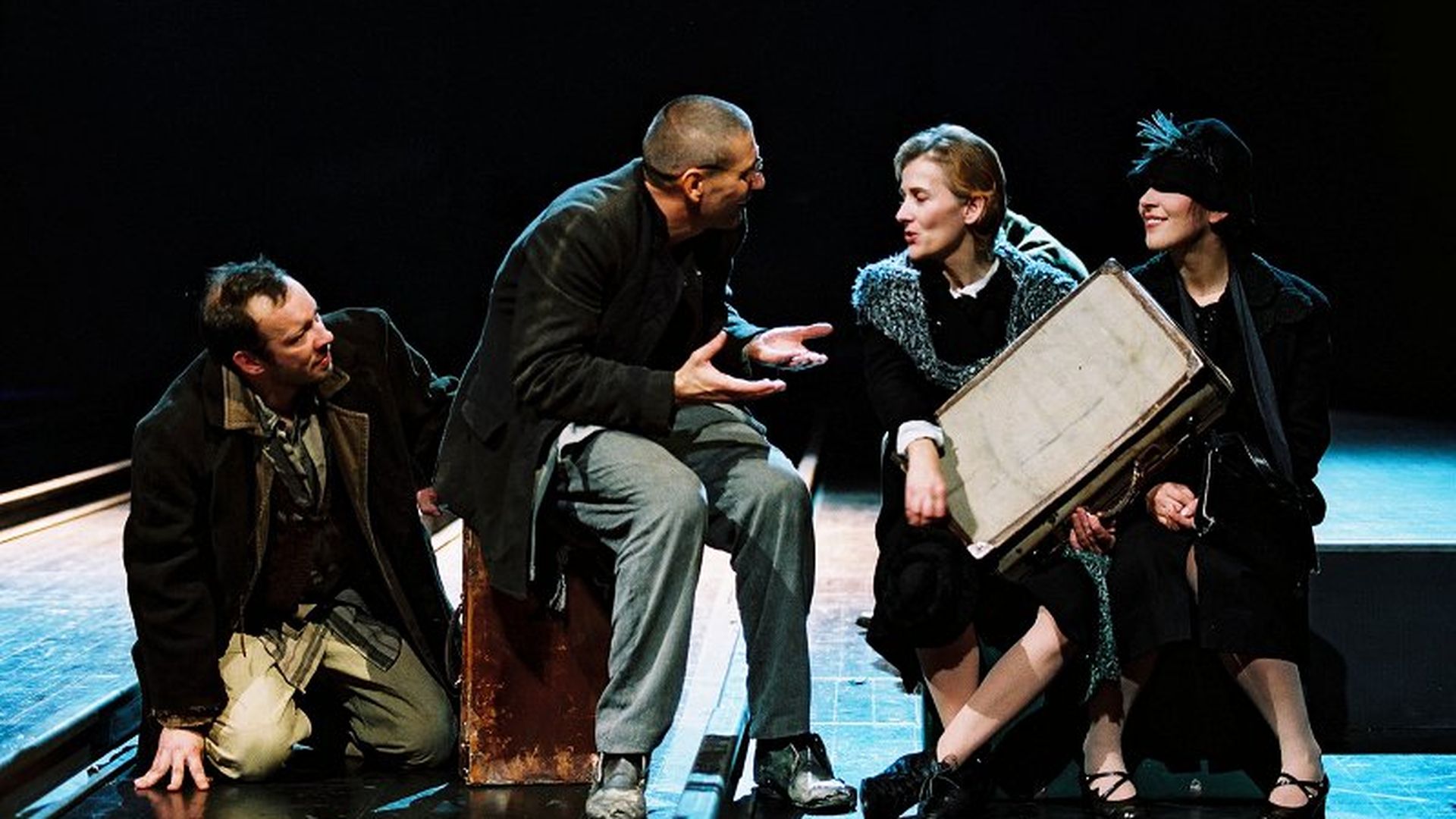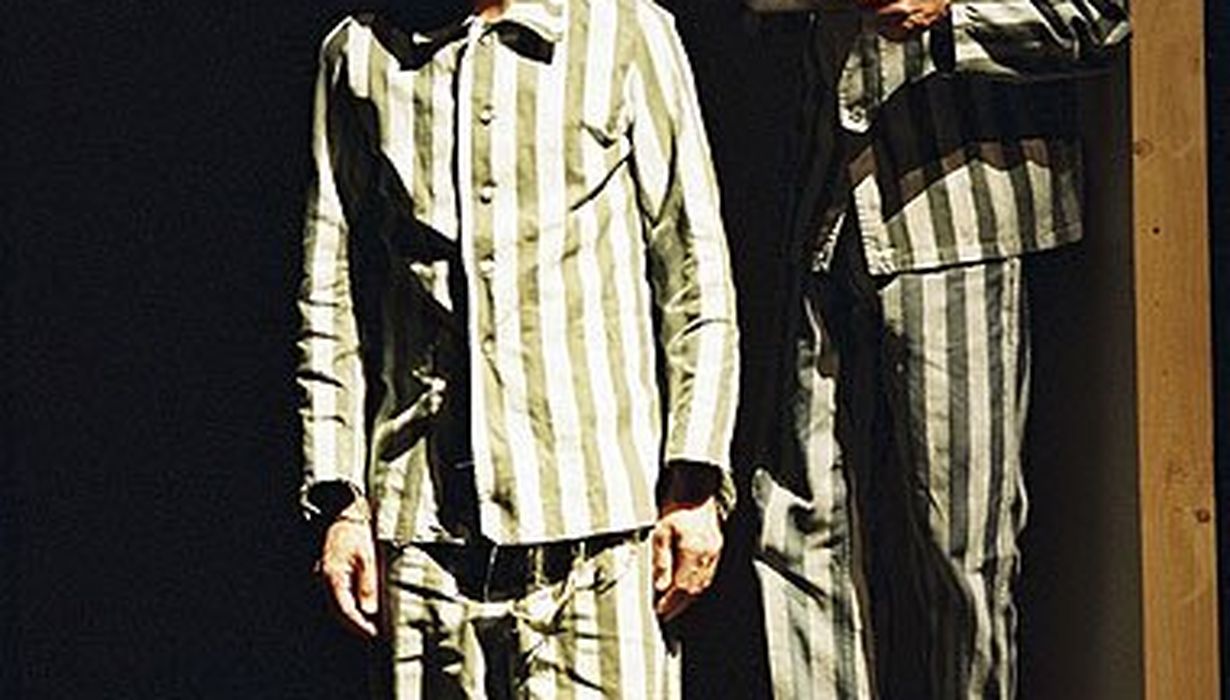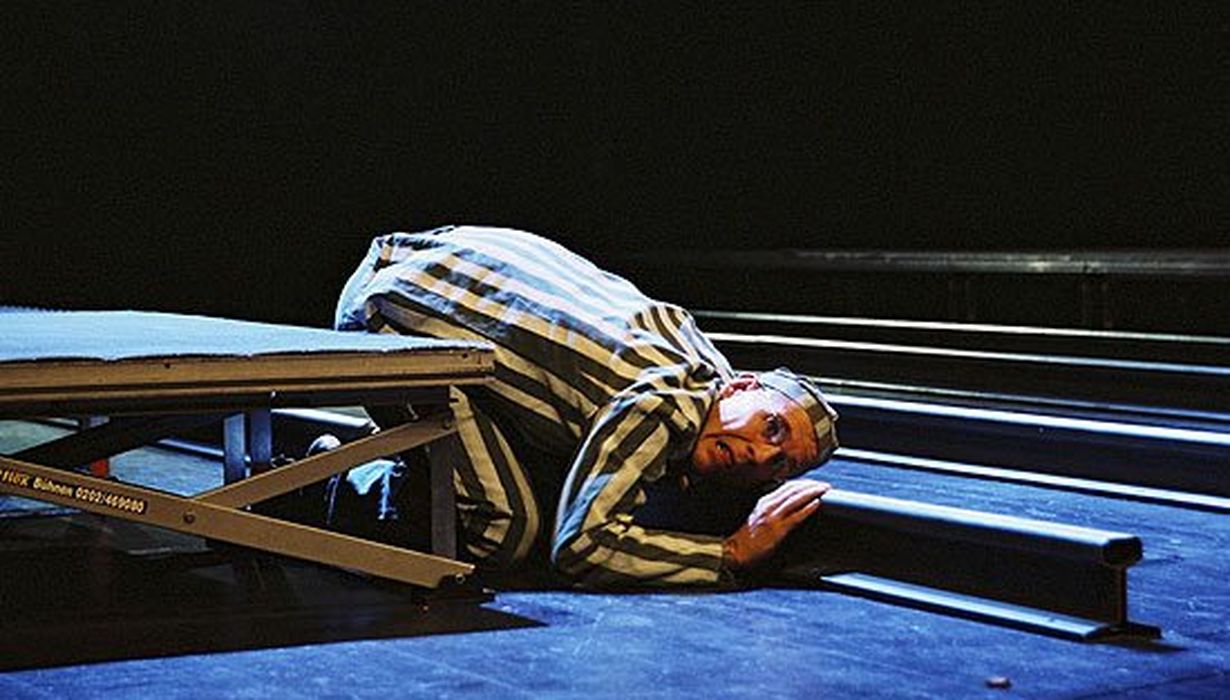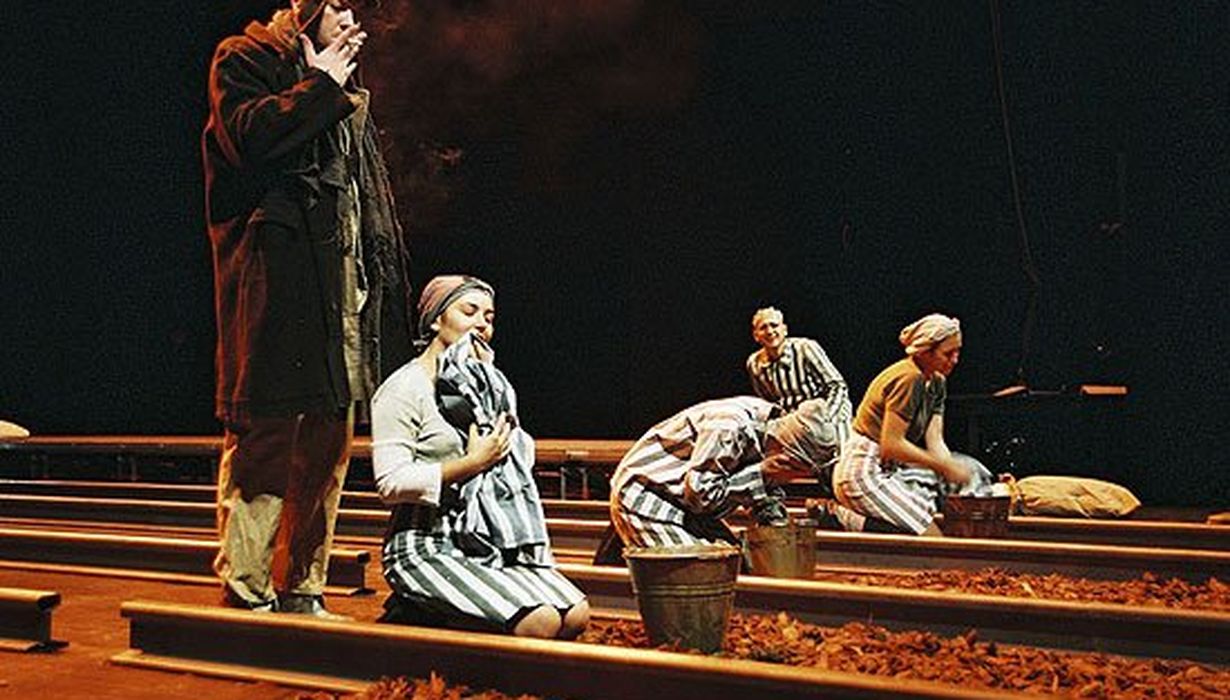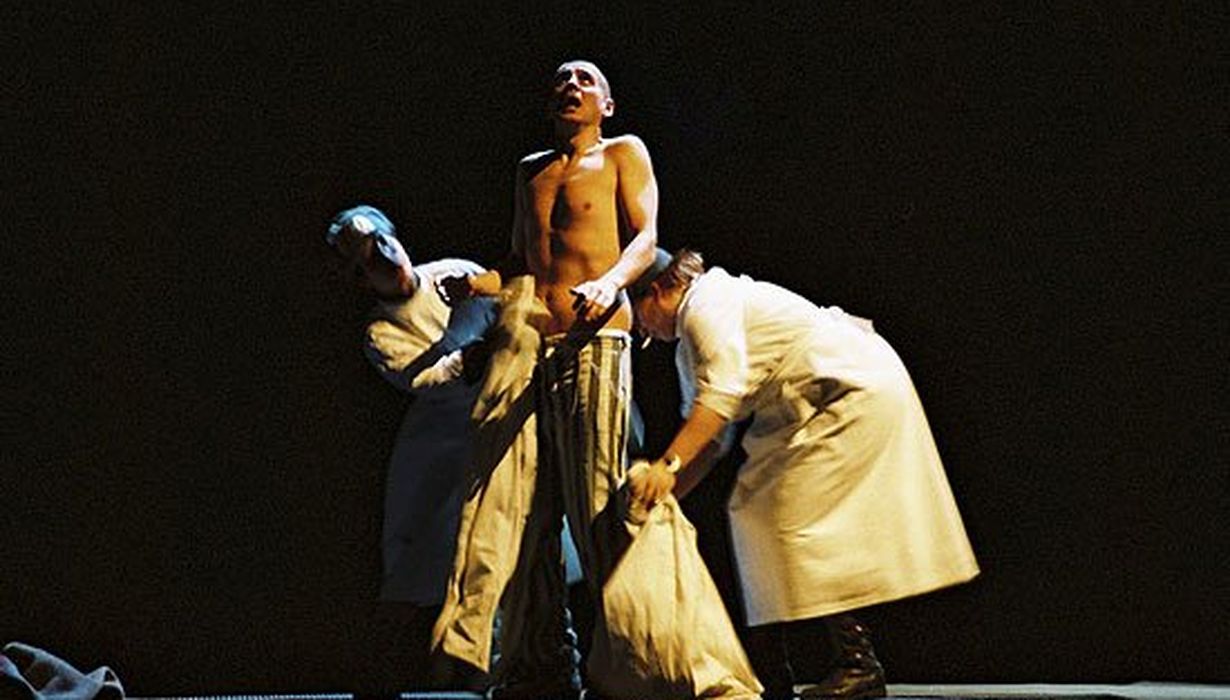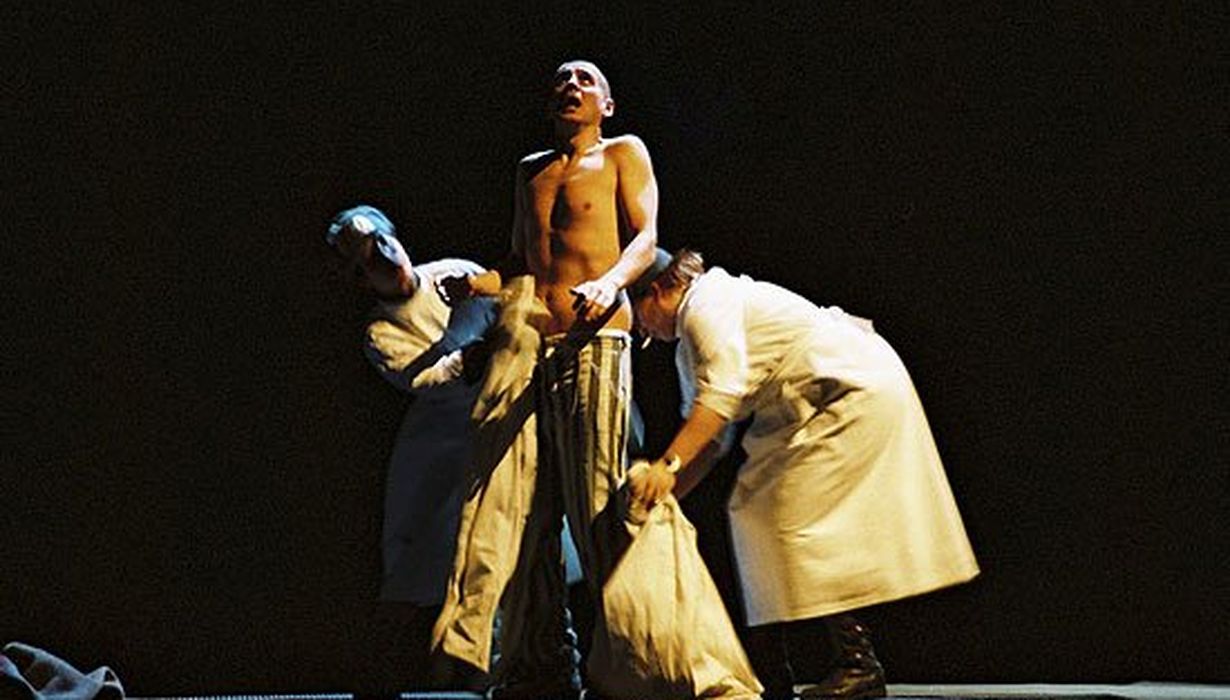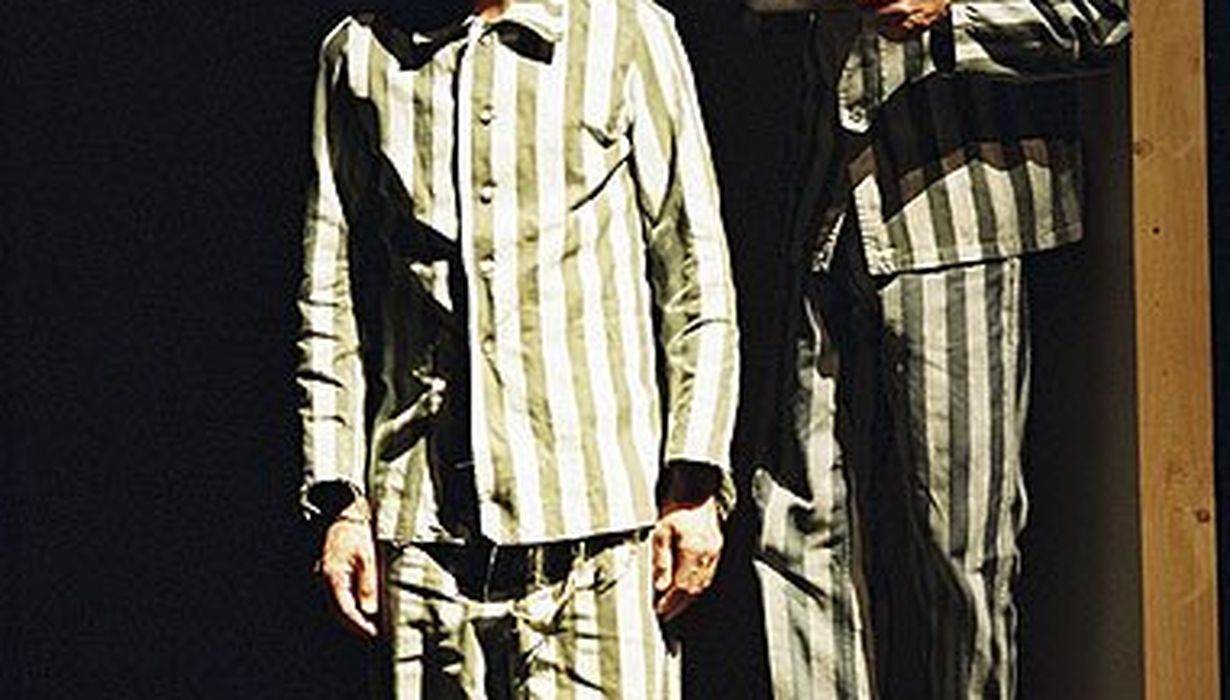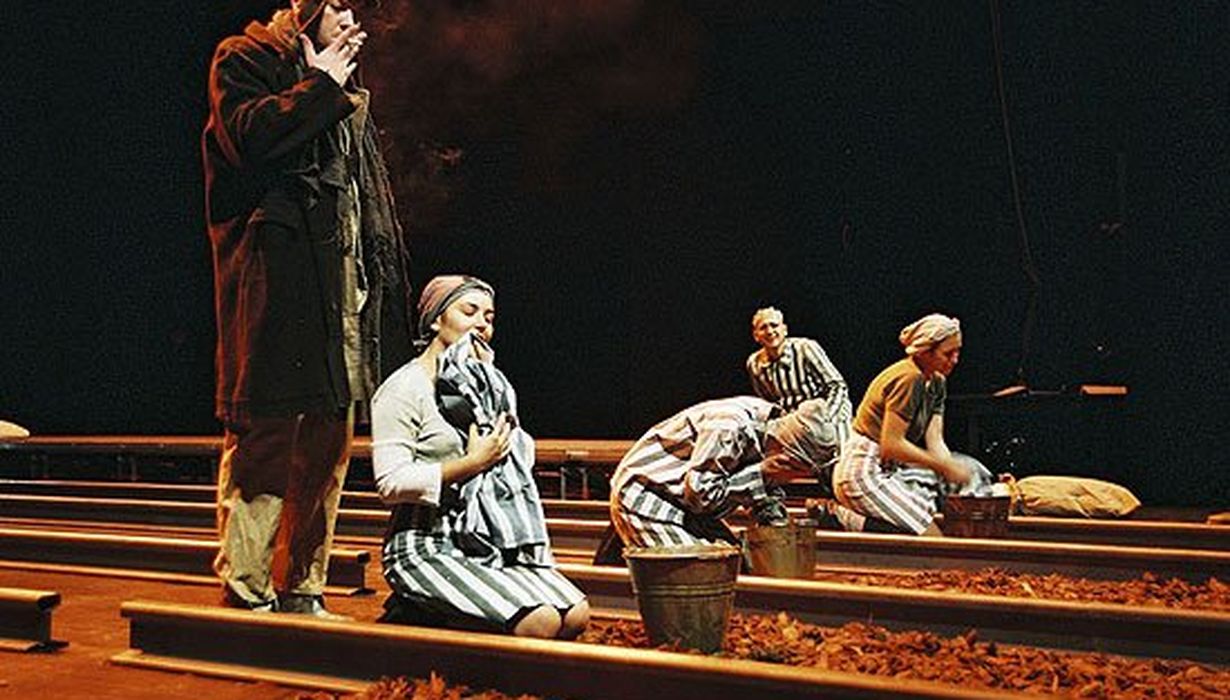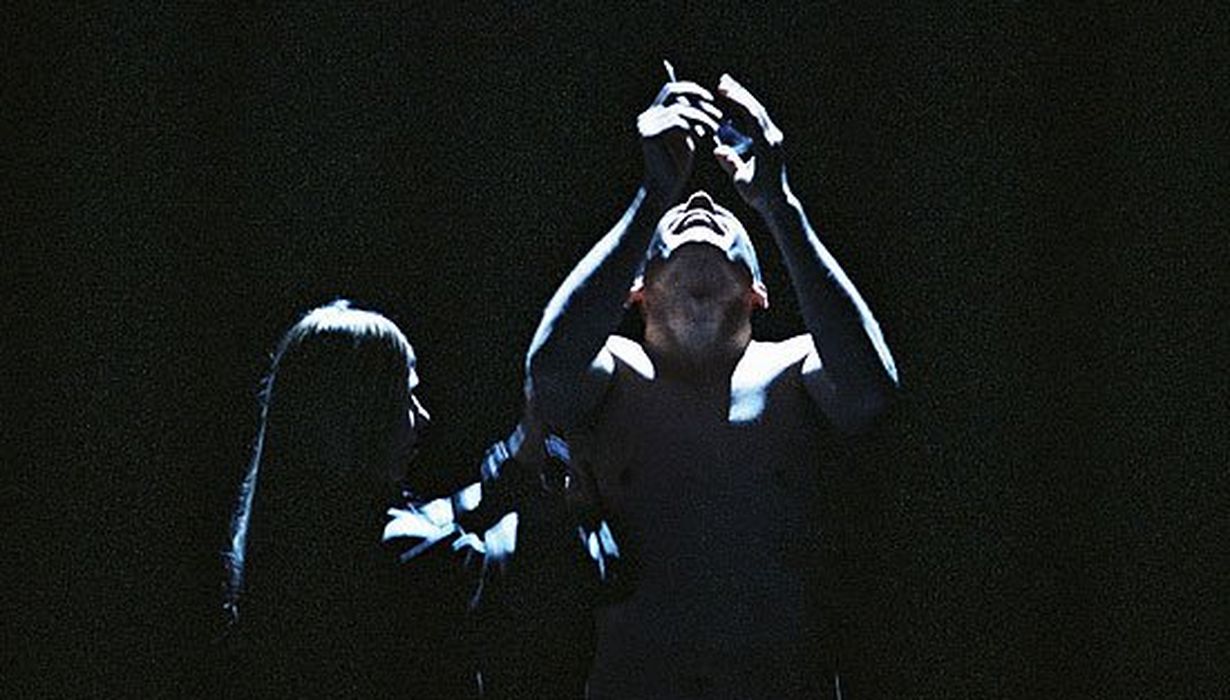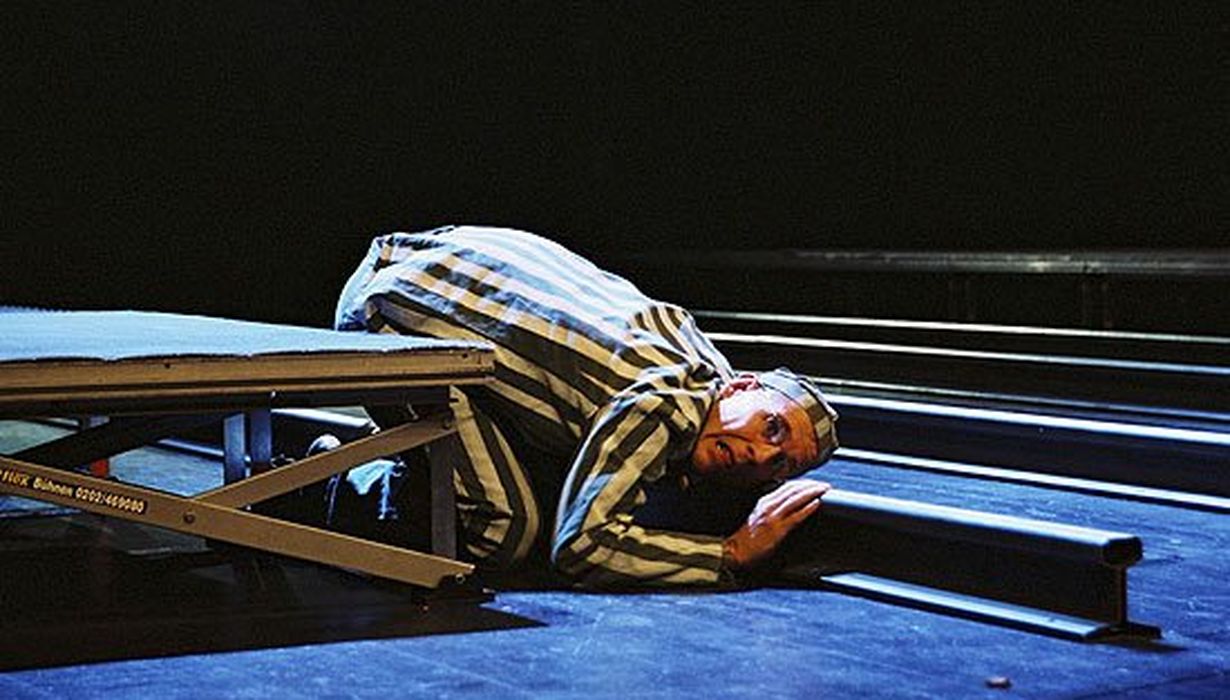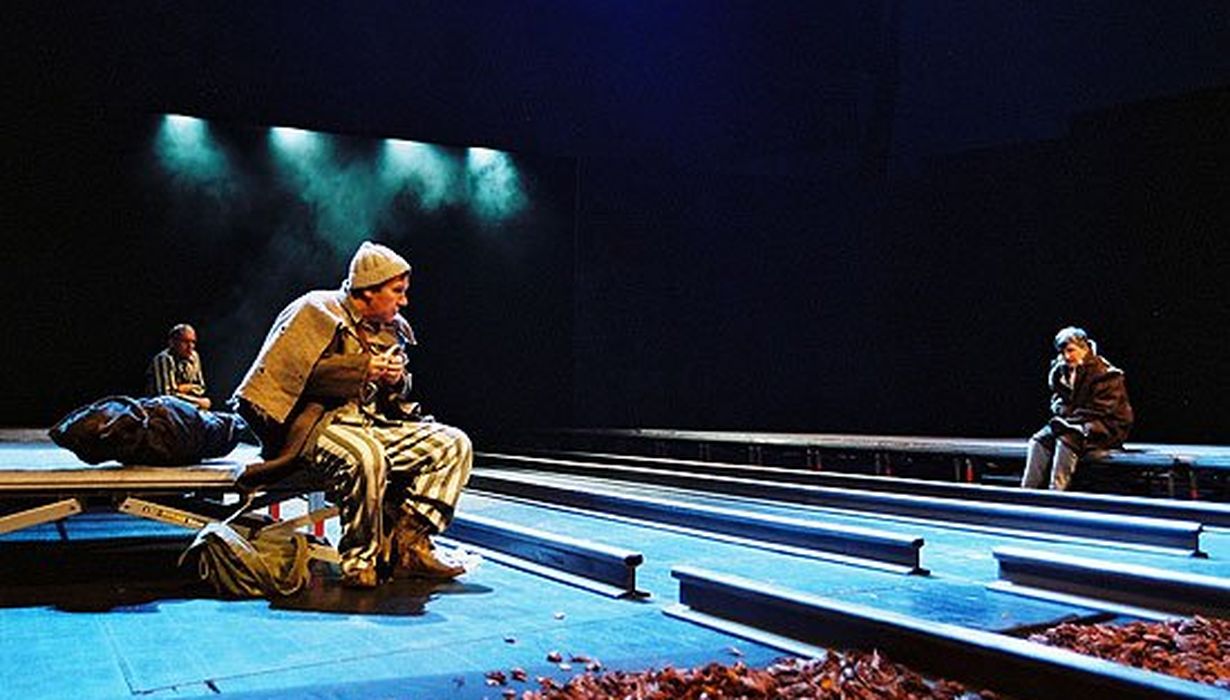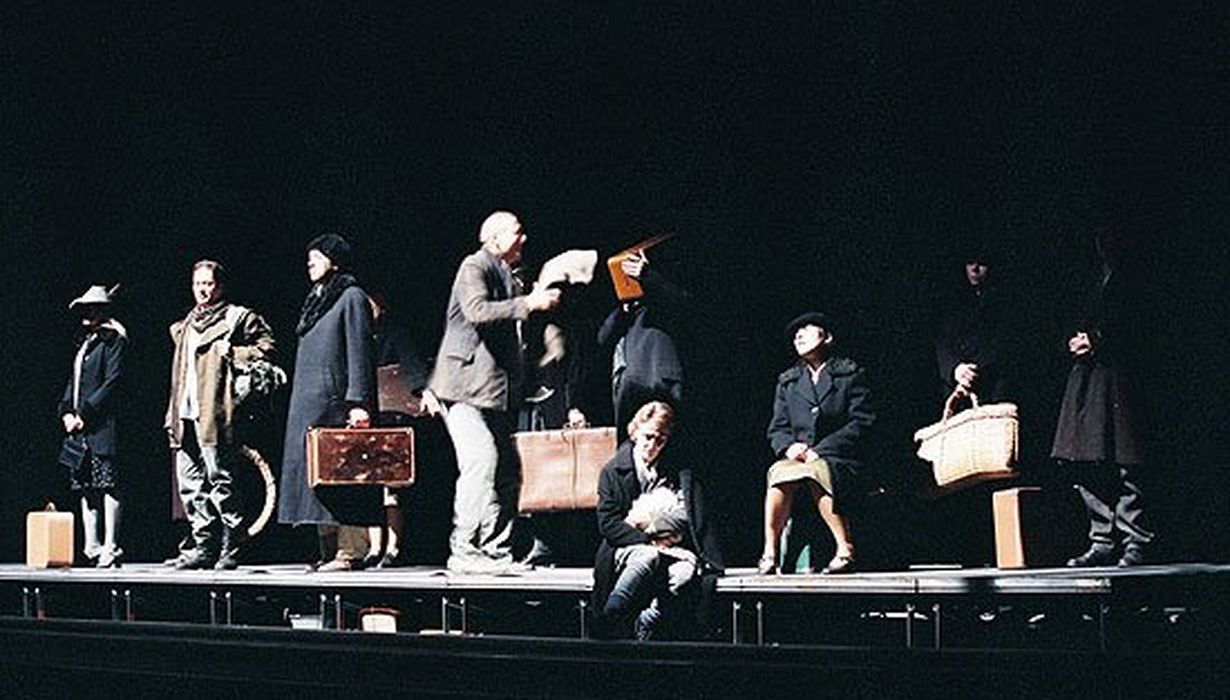PREMIERE
20. november 2004
1945: the war is over, the survivors from the Nazi concentration camps in Poland are returning home - heading south, crossing the Soviet Union. The journey is long and seems almost never-ending; former prisoners, marked by their terrible experience, encounter lands and people who also carry unhealed wounds of war. The past is gone, but not forgotten; the future is totally uncertain. Will it be incorrigibly tainted by the past? Or will the past be what clears the evil out of it? The country, dealt with in The Truce, is somewhere in between, in all the senses of the world: the geographical, the historical, the ideological, the personal and existential, artistic.
The main part of the story for The Truce is taken from the novel-travelogue of the same name, written by the Italian writer Primo Levi, who is considered as one of the most discerning chroniclers of the holocaust experience. Levi's bizarre, dark, touching, and also funny travel episodes are intertwined with quotations and paraphrases of the European literary history, which flow through human mind as if they were tiny bits of plasma, and at the same time create space for reflection on individual experience, and also the experience of our civilisation; the text combines the epic breath of travelling through history and myth with intimate moments on "stations" and philosophical disputes about the man and the world the good and the evil.
Creators
-
Director
Janusz Kica -
Assistant to Director
Špela Virant -
Dramaturg
Martina Mrhar -
Language Consultant
Srečko Fišer -
Set Designer
Marko Japelj -
Costume Designer
Slavica Radović -
Composer and Repetiteur*
Arturo Annecchino -
Light Designer
Samo Oblokar -
Assistant to Set Designer
Aleksander Blažica
Performing
-
Ivo Barišič/ Alida Bevk
k. g.
/ Radoš Bolčina
k. g.
/ Ana Facchini
k. g.
/ Jože Hrovat
k. g.
/ Gorazd Jakomini
k. g.
/ Lara Jankovič P.
k. g.
/ Mira Lampe-Vujičić
k. g.
/ Iztok Mlakar
k. g.
/ Miha Nemec
k. g.
/ Helena Peršuh
k. g.
/ Dušanka Ristić
k. g.
/ Marjuta Slamič
k. g.
/ Branko Šturbej
k. g.
/ Milan Vodopivec
k. g.
In the Media
Scenes from the middleworld
The second premiere at the SNG Nova Gorica was that of Meanwhile, a new play - his fourth - by the in-house playwright, translator and language adviser Srečko Fišer. This review is based on the performance as seen on 25th November.
The incentive for this broad historic fresco segmented into 20 realistically stylised fragments "based on the motives of the novel The Truce" by the relentless Italian concentration camp survivor and writer Primo Levi came from the international ETC project Theatres of Europe: Mirror of Displaced Populations. The play desires to, and in most part succeeds in, reviving the suffering of a "lucky survivor" from the Auschwitz concentration camp (a 25-year old Italian Jew Aldo). It does so in a way that makes it intelligible for the modern and globalised audiences while shaping its contents into a metaphor for the endangered "little man". The text, which uses Odysseus's journey and Orpheus's poetry to place an internee's journey through the chaos of the post-war Europe into a timeless frame of the ancient Greek mythology, also includes quotations and paraphrases of Homer, Checkov, Kafka, Platonov and Celan.
The director Janusz Kica, aided by the assistant špela Virant and the dramaturge Martina Mrhar, is sensitive in the way he measures the feelings of anxiety and despair in the protagonist's stylised and fragmented journey through the inhospitable "middleworld" of post-war chaos. His suggestive use of primal elements (water, fire, smoke) and animals (a sheep, a hen) is a meaningful introduction of the elementaries of life and the unpredictabilities of nature into the artificial theatre environment in a very meaningful way. By carefully shaping Aldo's numerous encounters with representatives of European nations, and their inner dynamics, the director filled Aldo's mental "baggage", and it is the weight of this baggage that makes the concentration camp survivor choose a ritual self-destruction (self-cremation and a passage to the dead).
Marko Japelj's scenography is well conceived and its elements (rails, wagons, elevated platforms, metal screens which open and close our vistas and the stylised showers and lights set above the stage) allow for rapid scene changes and strengthen the feeling of individual helplessness in the face of the mechanical grinding of the wheels of history. They also mark the transient in any human journey as the fundamental and sole truth of being. Slavica Radović's costumes, historic and characteristic of nations and individuals as well as simultaneously free and imaginative, facilitate characterization, harmonious setting and appropriate mood. The well suited soundscapes and musical background is the work of Arturo Annechino, who also used pieces by Shostakovich and the Bratsch group. Radoš Bolčina plays the ethically upright and steadfast intellectual Aldo whodevelops into an increasingly passive and resigned traveller. He only finds peace on his doorstep, after having suffered the concentration camp hell and the purgatory of the post-war chaos. From this harmonious, but individualised theatre fresco (in which actors Ivo Barišič, Alida Bevk, Ana Facchini, Jože Horvat, Gorazd Jakomini, Lara P. Jankovič, Mira Lampe Vujičić, Iztok Mlakar, Miha Nemec, Helena Peršuh, Dušanka Ristić, Marjuta Slamič and Milan Vodopivec created more that one role each), we can single out Branko šturbej as Aldo's severest moral antagonist, the ruthlessly adaptable and cynical friend - the Greek - who also chooses radical self-destruction as the only possibility of flight from the hostile Middleworld.
Slavko Pezdir, Delo, 27. 9. 2004
The Burden of the Unspeakable
Srečko Fišer's play Meanwhile is based on the motives from the novel The Truce by the Italian novelist, poet and essayist Primo Levi, one of those individuals who miraculously survived the Auschwitz concentration camp and one of the most widely respected witnesses of the horrors of war.
With the other makers of the performance, Fišer, better known as a translator, essayist and language advisor at the theatre in Nova Gorica faced the following challenge: how to stage the horrors that the Nazis inflicted upon the innocent in the camps while cynically mocking them that even if they survive, no-one would ever believe them? How to talk about something so horrible that it cannot be - and at the same time must be - told?
The play follows the odyssey (to paraphrase the title of Levi's final book) of the shipwrecked and then saved on their long return from Auschwitz through the rubble of Europe. It takes place in the chaotic juncture of history; in the meanwhile, as the play's title suggests; in the time when the tragedy has not yet ceased and adjusted to ethical relations those dark, savage human impulses awaken by the self-preservation instinct because of the war.
The scenographer Marko Japelj placed rails on the stage, a symbol of the many stations of this odyssey and a scene for the encounters of the main protagonist of this structurally fragmented play, Aldo, with other survivors. This is where we follow the travelogue of the re-incarnation of the people who had faced death in crematoria and are now trying to re-programme themselves for living. The search for their identities begins on the most fundamental level, in their relationship to their own bodies (caring about food, shoes) and then, through multilingual, multinational and multiethnic communication relationships (friendly, erotic, mercantile - faithfully mirrored also in the costumes by Slavica Radović), opens into a kaleidoscope of witty misunderstandings, moments that are tender as well as sardonic. This are the details that the director Janusz Kica focuses on when he tries to create, together with the dramaturge Martina Mrhar, a more universal fresco of human relationships occurring on the cracks of history. Fišer's play enables this, because it uses motives from the ancient Greek mythology, a time-tested way to say the "impossible", to render particular events more universal and to update them to the current acute danger of the state of war. Aldo is thus characterized through association with Odysseus, who was in the land of the dead, and Orpheus, to whom Lethe did not grant oblivion. Radoš Bolčina unites all three characters to create a heartrending, fragile, yet also firm intellectual who, even in the most testing moments, does not lose his ethical stance towards his fellow human beings. When staging the unthinkable the director leans on the improbability of what was experienced, weaves the mesh of the world from the patchwork of visions, dreams and awakenings. The music chosen and written by Arturo Annechino greately supports his efforts. It is quite probable that the consequence of this decision [to lean on the improbability of what was experienced], perfectly sound in the psychology of victims, is the absence of more radical and strained situations that would force the spectators to a more committed reading of the performance in particular and history in general. In the final, theatrically excellent and powerful scene of homecoming, a square room with his family slowly approaches from the back of the stage and Aldo goes through a dreadful epiphany: the memory of the experience will not be erased and hell will remain inside him. The promised home bursts into flames and Aldo, facing the audience, lights a cigarette. A sense of uneasiness begins to creep into the audience, a kind of anxiety and a feeling of guilt of having witnessed such horrors but also being unable to prevent them - and then suddenly, the effect is softened (a pity) by the final scene with Orpheus. Almost entire ensemble, committed and harmonious, of the Nova Gorica theatre participated in this staging of the "impossible" memories and reminders, and Branko šturbej joined them as a guest. Unfortunately, the space on offer here, does not allow to examine their creations.
Barbara Orel, Dnevnik, 22. 11. 2004
The premiere of the play, based on the motives from the novel The Truce by Primo Levi, brings us a story about a time in between, a time which is in fact marked only by the questions about who (and when one) is a human being. On stage, this fragmented performance has, as its central character, a man of liberty or submission, a man of searching and awareness. What is more important: the time after the war or the time of peace, the time before death or the one after, the time of travel or the time of arrival, the time of searching or the time when we find what we were searching for? There is no single answer; there is only a human being with all his consciousness who passes from one situation to another.
Fišer's play Meanwhile asks his audiences to consider the times and spaces of modernity through the story of a Jewish survivor of the horrors of the Nazi. Everything is intertwined: the story of a concentration camp internee and his emotions can also be a story from the ancient past, or the future; simultaneously, it also can be a story that we feel and live in our own contemporaneity. As the central character, Radoš Bolčina is extremely precise and sensitive in the way he creates a man of searching and awareness. The persons he meets are equally recognisable and full of symbolism. Kica's directing, supported by Marko Japelj's excellent scenography, faithfully follows Fišer's original structure of the text as one linked to diverse historical periods. The performance thus manages to retain tension and symbolism right until the end and leaves the spectator with strong feelings of the tragedy and the greatness of a man.
Klara Krapež, RA Slovenia 1, 21. 11. 2004, Radijski dnevnik at 19.00
Wandering in chaos
The premiere of the play Meanwhile, which we saw at the SNG Nova Gorica (Slovene National Theatre Nova Gorica) last Saturday could not be further from a classical conceptions of what constitutes a proper play. When following the wild odyssey of a concentration camp survivor who returns home after a nine-month roam across Europe, one cannot possibly speak about any kind of the unity of action, time, and space.
Srečko Fišer, the language advisor and translator at the theatre in Nova Gorica, conceptualised this complex play on the motives of a travelogue The Truce (1963) by one of the most perceptive investigators of the concentration camp phenomenon, the Italian Jew Primo Levi (1919-1987), who had survived Auschwitz and continued to testify for four decades what one human being is capable of inflicting upon another.
The entire process of the creation of the performance - from Levi's novel via Fišer's dramatisation, which the Polish director Janusz Kica staged with the help of his assistant špela Virant and dramaturge Martina Mrhar - actually deserves a thorough, in-depth analysis. During this process, not only were the content and the form changed, but the artistic nature of the text as well: many have been opposed, and quite justifiably, to calling Levi's work a novel, for it seems to be an autobiographic, documentary piece of literature. Fišer skilfully translated Levi's words into a dramatic form and added quite a lot of humour. Because of the very nature of Levi's novel, which contains a series of episodes, however, he could not avoid fragmentation and dispersion. On stage, though, this is certainly not effective. Fišer broadened the horizons of Levi's work, and his odyssey is no longer limited to the immediate post-war period, the truce between the two wars. Rather, it becomes a wandering, a two-thousand year long search for home, stretching across European history from antiquity to modernity.
Kica's directing roots Levi's horrific experience deeply in art. He skilfully stages the post-war chaos of a weary society and breathes a lot of poetry into the internee's journey. This poetry is also the result of the rich and varied scenography by Marko Japelj, the precise light design by Samo Oblokar, Slavica Radović's costumes - both, the veristic and the dream-like snow-white ones, and Arturo Annechino's music, which accompanies the events on stage, sometimes with loud marches and sometimes with even more effective, calm and soft music.
We cannot speak about the specific creations of the actors because each actor played more that one character, some of them up to five. Only two actors were able to create more complex roles. Radoš Bolčina was the exhausted, reserved and shy witness and, at the same time, the curious eternal investigator; he was so much more that the mere narrator from Levi's novel. Guest actor Branko šturbej form SNG Drama Ljubljana was his nihilistic, pragmatic and frank comrade the Greek. Fišer used the wide gulf between their personal points of view for a demanding philosophic and political debate, the longest dialogue in the entire play, in which he covered very pressing problems: democracy, uniting the nations, commerce, wars ... The director changed the role of the Greek, too: he ends by shooting himself on stage, which is probably the result of his extreme cynicism. However, one cannot overlook the allusions to Levi's suicide in 1987, with which the writer suddenly shook off the painful burden of memories and traumas.
We must single out another scene as well. The one in which two starving internees are trying to convince some Polish farmers to give them a hen in return for some plates. Lara Jankovič's singing solo is also very effective. Jankovič, as a German anti-Nazi, sings how unheeded her warnings to Hitler that this war will lead Germany and the whole world into perdition were. Such lament from a German woman is especially valuable, as it renders the black-and-white perception of this 20th century tragedy impossible. In the words of Levi, Fišer and Kica: in 1945, there were no winners. Everybody lost.
Despite the macabre picture of the world and the humankind in Meanwhile, the play whose cast includes also Helena Peršuh, Jože Horvat, Ivo Barišič, Iztok Mlakar, Mira Lampe- Vujičić, Miha Nemec, Milan Vodopivec and others, does not end in despair. It finds the solution in youth, in the character of am optimistic young woman (Alida Bevk) whose radiant face is turned towards future. The eternal searcher escapes from the abyss of nihilism to find a new way. And the search continues.
A Journey through the Chaotic Ruins of the Post-war Times
Srečko Fišer creates a collage Meanwhile based on the novel by Primo Levi
There is something that no distance of history and time can erase - pain and suffering; pain as humanity's eternal companion and as one of the most powerful themes in playwriting from the antiquity to the present day, and suffering as the representation of cynical supremacy of one human over another, bestial emotions and the annihilation of individuality, with the human ego and body being reduced to material and philosophical nothingness. This tragedy is embodied - it peaks - in Fascist and Nazi concentration camps where this primordial bestiality was transformed into indescribable cruelty. Yet, it was described. An Italian internee and writer Primo Levi was one of those who wrote about this cruelty in his novel The Truce; and Srečko Fišer translated it into a stage fresco Meanwhile. His dramatisation of this tragedy is the latest performance at the SNG Nova Gorica. This powerful collage consists of twenty realistic scenes that narrate the wanderings of an internee, an Italian Jew called Aldo, through a demolished, destroyed and morally weakened post-war Europe; a story that is a counterpart to the journey of Odysseus - the timeless mythological image of suffering that only Orphean melodies can alleviate.
Janusz Kica directed this journey through the chaotic ruins of the post-war time with great sensitivity and created the atmosphere of hopelessness in which the 25-year old protagonist (Radoš Bolčina) finds himself. His encounters with the members of various European nations are downright shocking. They culminate in the most horrible way possible in the scene where some "well-meaning" Europeans deny the atrocities of life in concentration camps, comparing it to vacationing. Kica draws a dramatically powerful and unified piece. The concentration camp survivor finds no compassion in people he meets and eventually loses his sense of purpose in life. He is faced with emptiness and, in the end, enters the state of self-destruction, since he has no-one to lean on, neither physically nor spiritually. Marko Japelj's scenography (with its rails, platforms, trains) underlines this helplessness of the individual to defy history and the transience of life. It indicates that the continuous departing and returning in order to find oneself only finishes with the end of a traveller, the end of his illusion. Not understood in the chaos of society, Aldo can no longer understand himself. His return home is now merely a pretext for his escape to eternity.
As the 25-year old Aldo, Radoš Bolčina fuses this plethora of elements, accentuated by Arturo Anecchino's music and fantasy costumes by Slavica Radović, into a horrifying, flashing thought: that identity cannot be confirmed in reality and that humanism will sooner or later be defeated. An individual's ethic does not resonate in his fellow men that are merely subjects to the satisfaction of their own emotions and visions. The cynical Greek, created by Branko šturbej, is, in a way, an antagonist to Aldo's steadfast naivety. His morally questionable character that only wants to satisfy his momentary needs and thus escape from that clockwork precision of chaos is nevertheless also condemned to self-destruction - a peculiar case of crystallisation of two extremes that meet the same fate.
Meanwhile by Srečko Fišer, Janusz Kica and other creators of the performance is therefore a deeply meaningful play, which speaks about both historical blindness and the hopelessness of a given individual. Ivo Barišič, Alida Bevk, Ana Facchini, Jože Hrovat, Gorazd Jakomini, Lara P. Jankovič, Mira Lampe Vujičić, Iztok Mlakar, Miha Nemec, Helena Peršuh, Dušanka Ristič, Marjuta Slamič and Milan Vodopivec enter this fresco with their small, but powerfully eloquent creations.
Marij Čuk, Primorski dnevnik, 1. 12. 2004
Festivals and performances abroad
Festivals:
35. teden slovenske drame Kranj (Slovenia), 2005
40. Borštnikovo srečanje Maribor Slovenia), 2005
1st International Theatre Festival NETA Podgorica (Montenegro), 2006
Festival Sterijino pozorje Novi Sad (Serbia), 2006
Sankt Peterburg (Russia), 2006
31. 3. 2020, 20.00. SPLET.



